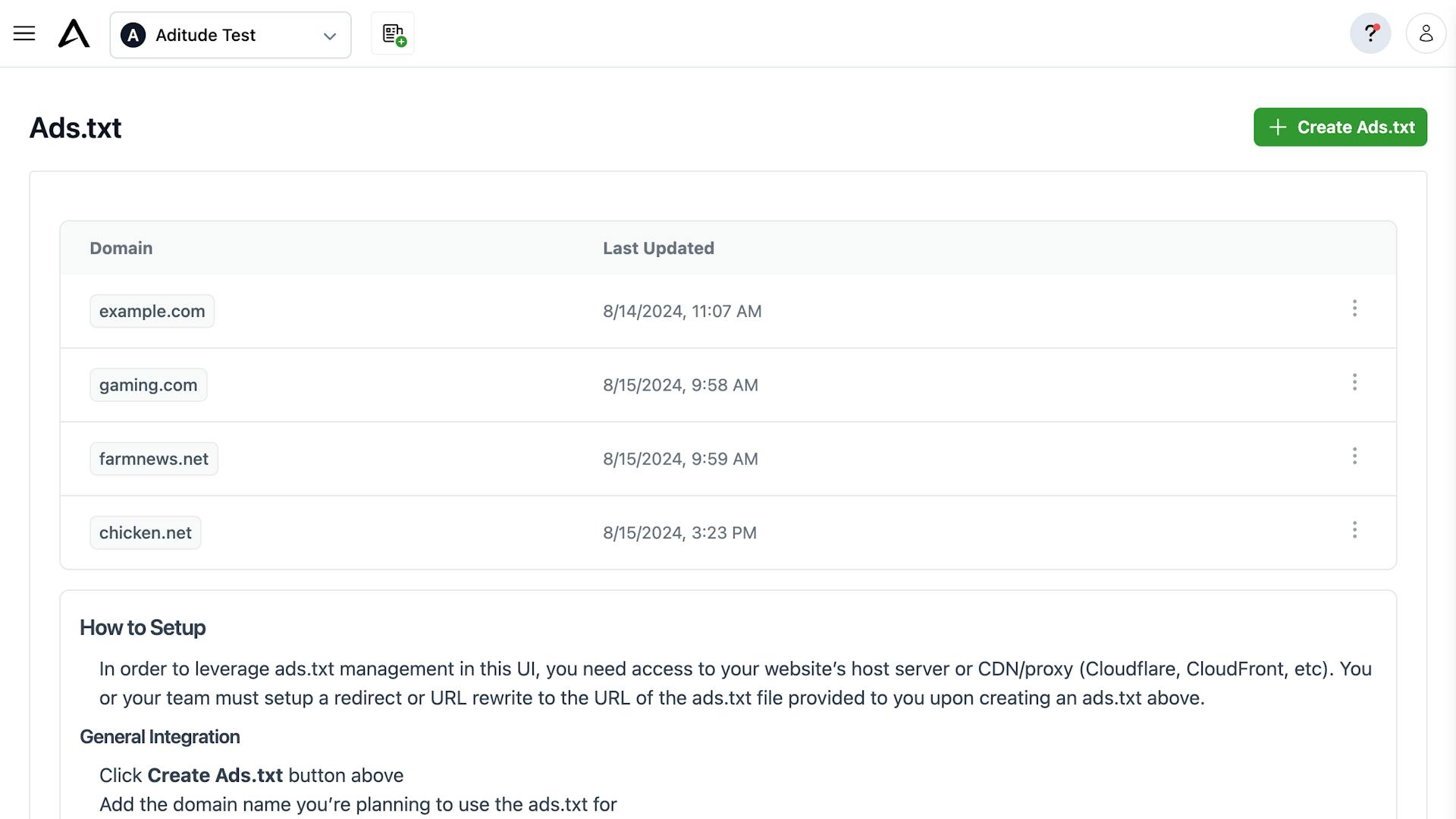What is Ads.txt?
Learn the basics of Ads.txt and its impact on reducing ad fraud in digital advertising. This blog by Josh Deckard, Director of Engineering at Aditude, explores how Ads.txt works, the challenges it faces, and how Aditude’s innovative solutions ensure that publishers maintain transparency and maximize revenue in an ever-evolving programmatic ecosystem.

With the ever-evolving digital advertising supply chain, the need to ensure transparency and authenticity continues to be a pressing challenge. To address this challenge, the Interactive Advertising Bureau (IAB) introduced Ads.txt (Authorized Digital Sellers) in May 2017. Ads.txt is a simple initiative aimed at combating ad fraud by increasing transparency in the publisher segment of the supply chain. It is essentially a text file that publishers place on their web servers that lists all the companies authorized to sell their ad inventory. Advertisers and DSPs can then use this information to verify whether a seller is authorized to sell inventory for that particular publisher. In collaboration with other IAB initiatives, Ads.txt plays a crucial role in the ongoing fight against ad fraud.
The Basics of Ads.txt
Ads.txt is a public record that declares which companies are allowed to sell a publisher's ad inventory. Conceptually, it is a straightforward solution to a complex problem, helping advertisers ensure they are buying legitimate inventory from authorized sellers, thus reducing fraudulent activities.
The structure of an Ads.txt file is simple and human-readable. It typically includes four fields:
- Domain Name of the Advertising System: The domain name of the company that is authorized to sell the inventory.
- Publisher Account ID: The unique ID associated with the publisher's account within the advertising system.
- Type of Relationship: This can either be "DIRECT" (indicating a direct relationship between the publisher and the seller) or "RESELLER" (indicating that the seller is authorized to resell the inventory).
- Certification Authority ID (optional): An ID issued by a certification authority if the seller is certified.
A typical Ads.txt entry looks like this:
example.com, 12345, DIRECT, A01B23C45D67
What Problem Does Ads.txt Solve?
The digital advertising industry, while highly lucrative, is also plagued by fraud. Ad fraud costs businesses billions of dollars annually and comes in various forms, including domain spoofing, where fraudulent entities sell counterfeit inventory by mimicking a legitimate publisher's domain. This practice deceives advertisers into buying fake impressions, resulting in wasted ad spend and diminished returns on investment.
Ads.txt addresses this issue by giving publishers a tool to publicly declare which companies are authorized to sell their inventory. By doing so, it provides advertisers with a way to verify the authenticity of the inventory they are purchasing, ensuring their ads are shown on legitimate sites. This increased transparency in the supply chain helps reduce the occurrence of ad fraud, protecting both publishers and advertisers.
Ads.txt primarily addresses domain spoofing and unauthorized reselling, but it also contributes to reducing other types of fraud, including inventory arbitrage, misrepresentation of inventory, ad stack flooding, and the sale of fake inventory.
How Does Ads.txt Work?
The implementation of Ads.txt is straightforward, yet its impact is significant. Here's how it works:
- Publishers Create and Publish Ads.txt Files: Publishers create an Ads.txt file containing the details of their authorized sellers and upload it to the root directory of their website. This file is then publicly accessible, allowing anyone to see which entities are authorized to sell their ad space.
- Advertisers and DSPs (Demand-Side Platforms) Crawl Ads.txt Files: Advertisers and DSPs regularly crawl the web to gather Ads.txt files from publishers' websites. This data is then used to verify whether a seller is authorized to sell inventory for a particular publisher.
- Verification Process: When an advertiser bids on an impression, the DSP checks the Ads.txt file of the publisher’s site to confirm that the seller is listed as an authorized seller. If the seller is not listed, the DSP may choose to avoid purchasing the impression, thereby avoiding potential fraud.
- Purchase of Verified Impressions: By using Ads.txt, advertisers can ensure that their ad spend goes towards purchasing legitimate impressions, and publishers can ensure that their inventory is being sold through authorized channels.
Ads.txt at Aditude
At Aditude, we understand the critical role that Ads.txt plays in maintaining transparency and trust in the programmatic advertising ecosystem. However, while Ads.txt is a powerful tool, it is not without its vulnerabilities, particularly when it comes to keeping the file up-to-date.
One of the most significant challenges with Ads.txt is ensuring that it is always current. If a publisher's Ads.txt file is outdated, it can result in authorized sellers being excluded, potentially leading to lost revenue and decreased transparency. Traditionally, updating the Ads.txt file requires involving a web developer, which can be a slow and cumbersome process. This method introduces the risk of delays and errors, especially when updates are infrequent or forgotten.

Aditude’s solution addresses these challenges head-on. In August 2024, Aditude released a new feature on the Aditude Platform that simplifies the management of Ads.txt files. This feature allows publishers to control and update their Ads.txt files directly from the platform, bypassing the need to involve a web developer for each update. This streamlined process ensures that the Ads.txt file remains current, reducing the risk of revenue loss due to outdated information.
Moreover, Aditude has introduced additional features that enhance the effectiveness of Ads.txt management:
- Validation: This feature ensures that the syntax of the Ads.txt file is correct and identifies possible duplicates or other misconfigurations. By catching these issues early, publishers can avoid potential disruptions and maintain the integrity of their Ads.txt file.
- Alerting: Aditude’s alerting feature performs a "heartbeat check" to verify that the Ads.txt file is accessible. Whether Aditude is hosting the file or the publisher hosts it independently, this feature notifies publishers if there are any accessibility issues or potential routing misconfigurations. This proactive alerting helps ensure that the Ads.txt file is always functional and accessible, preventing any gaps in protection.
Furthermore, Aditude’s ad operations team can make updates on behalf of publishers without requiring them to contact a developer, further accelerating the process and minimizing the chances of errors. This proactive approach not only ensures that the Ads.txt file is always up-to-date but also alleviates the administrative burden on publishers, allowing them to focus on other critical aspects of their business.
Is Ads.txt Being Adopted by Publishers?
Since its introduction, Ads.txt has seen widespread adoption across the industry. According to the IAB Tech Lab, by 2019, over 80% of the top 1,000 websites that sell ads programmatically had implemented Ads.txt files. The adoption rate continues to grow as the industry recognizes the importance of transparency in combating ad fraud.
Large publishers and smaller sites alike have embraced Ads.txt, understanding that it not only helps protect their inventory but also builds trust with advertisers. Advertisers, in turn, are more likely to spend their budgets on sites that use Ads.txt, knowing that their investments are less likely to be wasted on fraudulent impressions.
Final Thoughts
Ads.txt has become a cornerstone in the fight against ad fraud, offering a simple yet effective solution for increasing transparency in the programmatic advertising supply chain. By allowing publishers to publicly declare their authorized sellers, Ads.txt helps protect advertisers from fraudulent activity and ensures that ad spend is directed towards legitimate inventory.
However, as with any system, Ads.txt is not without its own challenges. The emergence of vulnerabilities like the Ads.txt botnet scam serves as a reminder that ongoing vigilance and innovation are needed to stay ahead of cybercriminals. As the digital advertising ecosystem continues to evolve, it is likely that Ads.txt will also need to adapt, incorporating new technologies and best practices to remain effective.
In conclusion, Ads.txt is a crucial step towards a more transparent and secure programmatic advertising environment. Publishers and advertisers alike should continue to adopt and refine their use of Ads.txt, ensuring they remain protected in an increasingly complex digital landscape.




